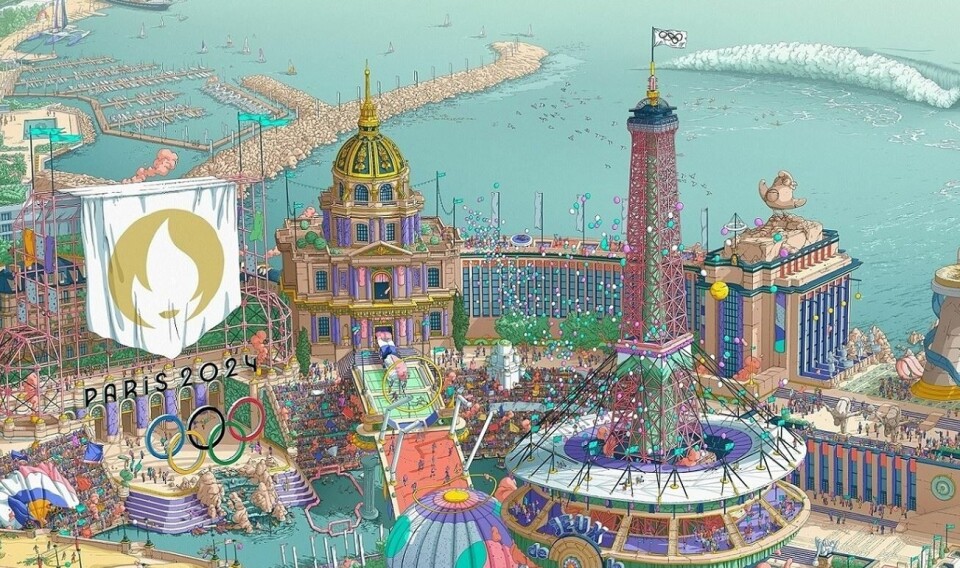-
Mysterious boom rattles residents in south-west France
Local community turns to social media for answers
-
France tightens reimbursement rules for flight delays or cancellations
New measures include mandatory mediation and new claim procedures
-
What snow conditions look like for skiers across French Alps and Pyrenees
Ski resorts are expected to get busier as school holidays begin this weekend
Paris Olympics’ official posters: no French flag but homage to UK town
There is also controversy surrounding removal of cross from Parisian landmark

The official posters for the 2024 Olympic and Paralympic Games have been revealed - and are receiving backlash over the lack of a French flag.
The full version of the posters that can be seen below show Paris as a ‘city of sport’, using fantastical landscapes to weave Olympic events with the city itself.
Une image vaut mille mots, voici les 2 affiches officielles de nos Jeux : une Olympique et une Paralympique.
— Paris 2024 (@Paris2024) March 4, 2024
Ensemble, elles forment une seule et même grande histoire, celle de #Paris2024 🖼️ pic.twitter.com/7oxay5uSz2
The two posters are separate entities, but when placed together seamlessly form one larger artistic piece.
However, certain omissions, including the lack of a French tricolore have been criticised.
Jordan Bardella, president of the far-right Rassemblement National (RN) party, said the lack of a French flag showed “contempt” for the country.
In addition, the poster removed the cross at the top of the dome of Les Invalides, which Mr Bardella called “the cancelling out of [France’s] Christian heritage.”
Other criticisms were made over the posters’ artistic style, which detractors say is too complicated and messy.
Journalist Dominique Grimault said the poster seemed to be “designed for children,” and Les Républicains (LR) senator Stéphane Le Rudulier said it looked more like a “bad manga [a type of Japanese cartoon] than an Olympic poster.”
Some people on social media likened the art style to the children’s books Where’s Wally? (Où est Charlie ? in France), with too much information being contained in the poster.
Read more: This is what the Paris 2024 Olympic torch will look like
An homage to Stoke Mandeville Hospital in the UK, where the precursor to the modern Paralympic Games were first held, is included.
Backlash over French ‘erasure’
The posters, created by artist Ugo Gattoni, feature stylistic versions of iconic Parisian landmarks, in a distinctive theme labelled ‘the fantasy world of sport’.
Together, the posters show representations of almost 50 Olympic and Paralympic sports, and contain eight of the official ‘Phryges’ Olympic mascots.
Read more: Olympic mascot contract revives France’s forgotten toymaking industry
The mixture of landmarks and events continues the principal theme of Paris 2024, combining the city with the event itself – for the first time ever, the opening ceremony will not be in a stadium but along the Seine river.
The official flag of the Olympic Games is shown, however the French flag – or any symbolic reference using the red, white, and blue colours – is absent.
Thomas Ménagé, spokesman for the RN, said it was "a sadly ridiculous example of the great erasure of France,” that no flag was present.
President of the LR, Eric Ciotti, also took umbrage at the removal of the cross on Les Invalides, which he said “denies the very identity of this building as well as French history.”
Les Invalides is not a religious building, however there is a cross present on the building’s dome. In the poster, this has been removed although the rest of the building is unchanged.
One caller to French radio channel Europe1 said the removal of the cross was a “scandal… to all those who fought for France.”
Les Invalides hosts a number of military structures, including museums dedicated to France’s military history, a retirement home for ex-soldiers, and the tomb of Napoléon.
The reason for the cross’ removal (although not confirmed) is likely due to France’s rules on Laïcite, which prevent any religious symbols in public places or those associated with the government.
Read more: Laïcité: a bedrock of modern France
Tribute to famous UK hospital
In the top right-hand side of the Paralympic poster, across the sea a small island can be seen – representing the UK – which includes an archway in front of a medical complex.
It represents Stoke Mandeville Hospital in Buckinghamshire.
It was here that a German-British doctor, Ludwig Guttmann, began to use sport as a rehabilitation procedure for disabled people, particularly soldiers injured in World War Two.
The first ‘Stoke Mandeville Games’ were held at the hospital in 1948, on the same day as the start of the 1948 Olympics in London.
They are seen as a direct precursor to the modern Paralympic Games.
The event continued to be held every four years – with international disabled athletes joining subsequent tournaments – until 1960, when the first Paralympic Games were held in Rome, in conjunction with the Olympics.
A full set of other references in the posters has been compiled by French news outlet FranceInfo.
The posters will be on display as part of an exhibition until March 10 at the Musee d’Orsay, and can be purchased online from the Olympic shop for €29 each.
Visitors to Paris will be able to buy their version physically at a number of pop-up Olympic stores during the Games, as well as from FNAC stores.
Related articles
Paris 2024: Olympic flame’s route through France is revealed
SEE: which Olympic events are near you (not all are in Paris)
























